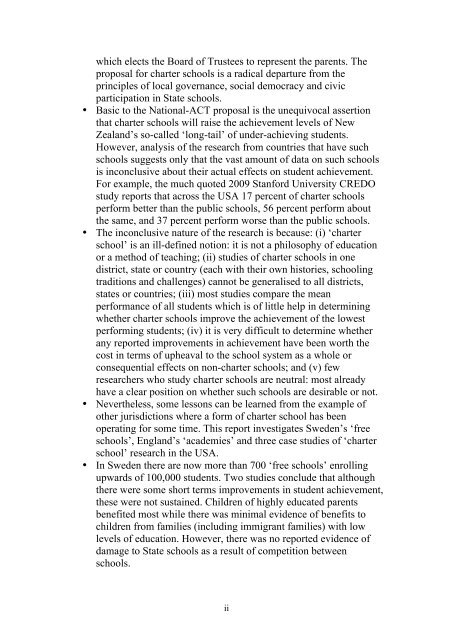Eprg charter schools for new zealand report
Eprg charter schools for new zealand report
Eprg charter schools for new zealand report
You also want an ePaper? Increase the reach of your titles
YUMPU automatically turns print PDFs into web optimized ePapers that Google loves.
which elects the Board of Trustees to represent the parents. The<br />
proposal <strong>for</strong> <strong>charter</strong> <strong>schools</strong> is a radical departure from the<br />
principles of local governance, social democracy and civic<br />
participation in State <strong>schools</strong>.<br />
• Basic to the National-ACT proposal is the unequivocal assertion<br />
that <strong>charter</strong> <strong>schools</strong> will raise the achievement levels of New<br />
Zealand’s so-called ‘long-tail’ of under-achieving students.<br />
However, analysis of the research from countries that have such<br />
<strong>schools</strong> suggests only that the vast amount of data on such <strong>schools</strong><br />
is inconclusive about their actual effects on student achievement.<br />
For example, the much quoted 2009 Stan<strong>for</strong>d University CREDO<br />
study <strong>report</strong>s that across the USA 17 percent of <strong>charter</strong> <strong>schools</strong><br />
per<strong>for</strong>m better than the public <strong>schools</strong>, 56 percent per<strong>for</strong>m about<br />
the same, and 37 percent per<strong>for</strong>m worse than the public <strong>schools</strong>.<br />
• The inconclusive nature of the research is because: (i) ‘<strong>charter</strong><br />
school’ is an ill-defined notion: it is not a philosophy of education<br />
or a method of teaching; (ii) studies of <strong>charter</strong> <strong>schools</strong> in one<br />
district, state or country (each with their own histories, schooling<br />
traditions and challenges) cannot be generalised to all districts,<br />
states or countries; (iii) most studies compare the mean<br />
per<strong>for</strong>mance of all students which is of little help in determining<br />
whether <strong>charter</strong> <strong>schools</strong> improve the achievement of the lowest<br />
per<strong>for</strong>ming students; (iv) it is very difficult to determine whether<br />
any <strong>report</strong>ed improvements in achievement have been worth the<br />
cost in terms of upheaval to the school system as a whole or<br />
consequential effects on non-<strong>charter</strong> <strong>schools</strong>; and (v) few<br />
researchers who study <strong>charter</strong> <strong>schools</strong> are neutral: most already<br />
have a clear position on whether such <strong>schools</strong> are desirable or not.<br />
• Nevertheless, some lessons can be learned from the example of<br />
other jurisdictions where a <strong>for</strong>m of <strong>charter</strong> school has been<br />
operating <strong>for</strong> some time. This <strong>report</strong> investigates Sweden’s ‘free<br />
<strong>schools</strong>’, England’s ‘academies’ and three case studies of ‘<strong>charter</strong><br />
school’ research in the USA.<br />
• In Sweden there are now more than 700 ‘free <strong>schools</strong>’ enrolling<br />
upwards of 100,000 students. Two studies conclude that although<br />
there were some short terms improvements in student achievement,<br />
these were not sustained. Children of highly educated parents<br />
benefited most while there was minimal evidence of benefits to<br />
children from families (including immigrant families) with low<br />
levels of education. However, there was no <strong>report</strong>ed evidence of<br />
damage to State <strong>schools</strong> as a result of competition between<br />
<strong>schools</strong>.<br />
! ii!


